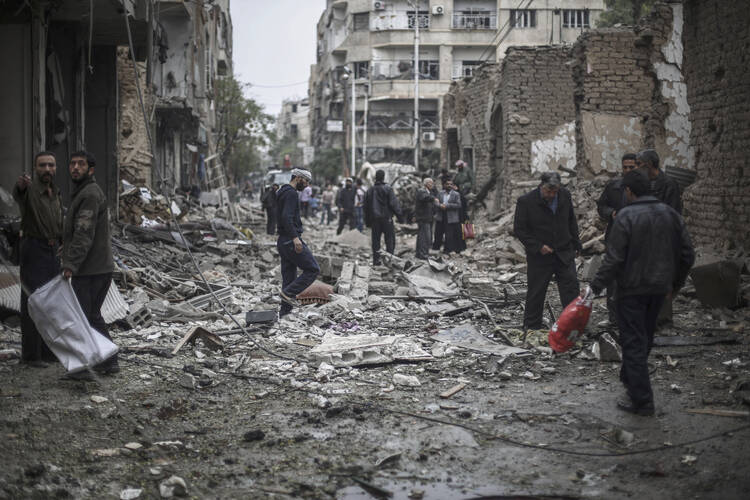Syriac Catholic bishops, meeting in Lebanon during their annual synod, called for a diplomatic solution to achieve peace in Syria and Iraq. In a statement released at the conclusion of the assembly, the bishops pleaded for an end to the civil war in Syria, now in its fifth year, and urged countries—particularly those directly involved in the conflict—to follow a path of “negotiation to find a peaceful political solution.”
With Syriac Catholic Patriarch Ignace Joseph III Younan presiding during the Oct. 26-29 gathering at the convent of Our Lady of Deliverance in Harissa, Lebanon, the bishops denounced the “barbaric acts” carried out by the Islamic State, pointing to the destruction of archaeological and cultural cites integral to the history of Syria and Iraq in places like Palmyra, Syria, and the ancient monasteries of Mar Behnam in Iraq and Mar Elias in Syria.
The bishops demanded the liberation of all hostages and renewed their call for the release of two Syrian bishops—Syriac Orthodox Metropolitan Gregorios Yohanna of Aleppo and Greek Orthodox Metropolitan Paul of Aleppo—kidnapped in April 2013. They lamented the tragedy of displacement and the resulting immigration facing Syriac Catholics. In Iraq, citizens of Mosul and the Nineveh Plain were uprooted in summer 2014 by Islamic State militants, resulting in the exodus of more than 100,000 Christians to the Kurdistan region in the north. Thousands have since emigrated to other countries.
The bishops appealed to key countries concerned with Iraq to support its army “to speed up the liberation of Mosul and Nineveh Plain so that people can come back to their homes and live in peace and security.” They also demanded “international guarantees from the United Nations, the central government and the Kurdistan region, to ensure the common security of living between Christians and other components after the return, and compensation for the property they lost.”
As the bishops issued their statement, there were indications of a possible Syrian breakthrough as negotiators from 19 states, including the United States, Russia, Saudi Arabia and Iran, gathered in Vienna. “Four and a half years of war in Syria we all believe has been far too long,” U.S. Secretary of State John Kerry told reporters. “The consequences of that war for so many people, innocent people, is beyond description…And so we came here…with the conviction that the fighting and the killing absolutely has to end.”
The secretary said it will take pressure “from many different directions to reverse the escalation of conflict and to lay a credible groundwork for peace.”
He said, using another name for the Islamic State, “Daesh and other terrorist organizations, we all believe, can never be allowed to unite or govern Syria. The United States position regarding Syria, I emphasize, has not changed.... There is no way that President Assad can unite and govern Syria. And we believe that Syrians deserve a different choice, and our goal is to work with Syrians from many factions to develop that choice.”
Secretary Kerry acknowledged that the U.S. position was diametrically opposed to that of the Russian Federation. “But,” he said, “we can’t allow that difference to get in the way of the possibility of diplomacy to end the killing and to find the solution.”
As if to remind all parties of the difficult task ahead, as the ministers began what could become dialogue to an eventual ceasefire, a missile barrage slammed into a suburb of Damascus, killing at least 40 people and wounding many others in the latest government attack on the rebel-held area.
The Syrian National Council, the main Western-backed opposition group in exile, blamed Russian airstrikes for the “massacre’’ in Douma. It said it was the second deadly attack in the past 24 hours after Russian air strikes bombed the main hospital in Douma a day earlier.








